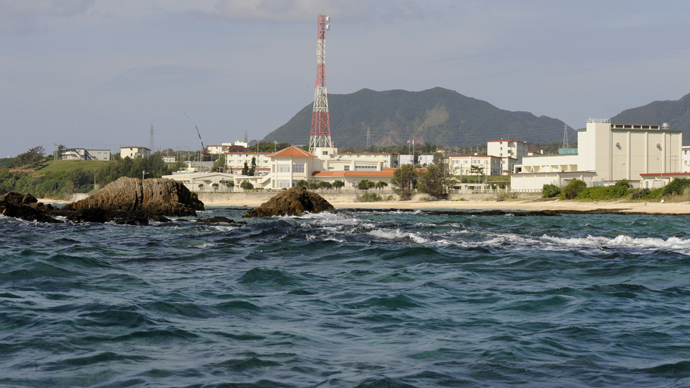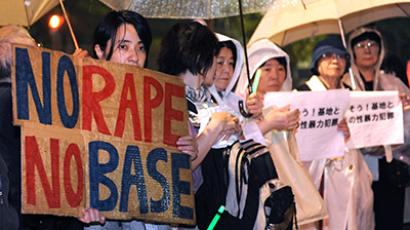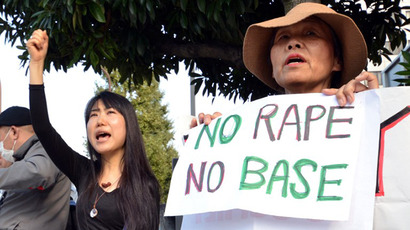Okinawa governor approves relocation of US airbase within prefecture

Okinawa officials approved the long-anticipated relocation of the US Marines Corps’ Futenma Air Station on Friday, according to Japan's defense ministry. The move settles decades of often heated negotiations between Tokyo and Washington.
Local officials signed up to a plan that paves the way for the construction of a new American military base on a coastal landfill within Okinawa Prefecture, AFP reported.
The Okinawa population is angered at the decision, and reports emerged crowds were gathering to protest.
Though Okinawa Governor, Hirokazu Nakaima, was originally against a deal to keep the controversial base in his jurisdiction, a Wednesday meeting with Japanese Prime Minister Shinzo Abe proved pivotal. Abe reportedly pledged a healthy annual sum of cash into Okinawa’s economy until 2021.
The defense ministry’s Okinawa bureau confirmed the deal. "The office received the document at 10:50 am. It was approved," an official from the ministry's Okinawa office said, as quoted by AFP.
The deal could face legal challenges and protests based on the stiff public opposition to the airbase staying in Okinawa.
The estimated cost of the relocation is about $8.6 billion, and Japan will cover $3.1 billion of that sum.
Nakaima’s approval is a breakthrough, as the plan to shutter Futenma - which is currently located in a densely-populated area - has been on hold for the past 17 years.
The United States agreed in 2006 to move the base to the coast, but local opposition prevented the potential shift. Anti-base sentiment and concern about US military operations at Futenma has long been an emotionally charged issue in Okinawa.
After the 25-minute meeting with Abe, Nakaima said, “I’m grateful for the surprisingly good proposals made by the prime minister.”
Yet the Japan Daily Press reports that Nakaima was likely to support the reclamation project even before Abe’s offer, based, in part, on political calculations ahead of an important, upcoming mayoral election in Nago, Okinawa. The race is being seen as a referendum on the base relocation plan.
Nakaima is expected to hold a press conference in Okinawa on Friday to officially announce his decision.
Tokyo and Washington are negotiating multiple plans regarding the relocation, according to the Japan Daily Press. One is to allow Japanese authorities to enter US bases for environmental checks and other official purposes, which Tokyo believes will complement the existing Status of Forces Agreement. Another is to advance the return of land where Futenma is currently, which is now scheduled for 2022. In addition, Japan is suggesting that US exercises involving the controversial MV-22 Osprey transport aircraft occur in several locations - not just in Okinawa.
Japan hosts some 50,000 American soldiers and officers, particularly in Okinawa. Their presence is a constant source of tension with local populations due to crimes committed by the servicemen, disruptions caused by military flights and land use by the US military.
For instance, last October, a local woman was raped by the US military.
In 1995, three Americans kidnapped and raped a 12-year-old Okinawan schoolgirl. The service members beat her, tied her up, and duct-taped her eyes and mouth while raping the child. The incident sparked mass protests against the US military presence.














